| Reviews & Columns |
|
Reviews DVD TV on DVD Blu-ray 4K UHD International DVDs In Theaters Reviews by Studio Video Games Features Collector Series DVDs Easter Egg Database Interviews DVD Talk Radio Feature Articles Columns Anime Talk DVD Savant Horror DVDs The M.O.D. Squad Art House HD Talk Silent DVD
|
DVD Talk Forum |
|
|
| Resources |
|
DVD Price Search Customer Service #'s RCE Info Links |
|
Columns
|
|
|
Van der Valk Mysteries: Set 1
"I'm a police officer. I have to uncover the truth...but I don't judge."
"I have to find the truth, not...wreak vengeance."
"I can't take anymore of this without a drink."
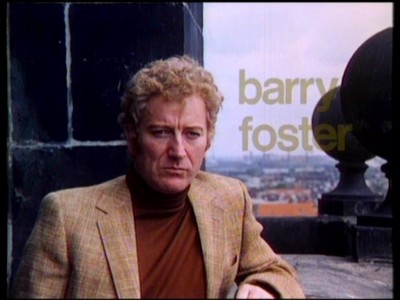
Acorn Media has released Van der Valk Mysteries: Set 1, a two-disc, six-episode collection of the first series (season) of Van der Valk, the 1972 Thames Television cop show based on Nicolas Freeling's fictional Dutch police detective, and starring fleece-haired Barry Foster. Partly shot on location in Amsterdam, Van der Valk should appeal to fans of vintage U.K. detective shows, an appeal due in no small part to the wired, tense presence of one of my favorite Hitchcock villains, Foster. Van der Valk may be light on action, and the mysteries hit-and-miss, but Foster keeps your interest.
Van der Valk's set-up should be familiar to fans of the genre. Amsterdam Commisaris Piet van der Valk (Barry Foster) just wants to enjoy his homelife in peace. His gorgeous French wife, Arlette (Susan Travers), makes beautiful meals and keeps their two children out of the way (we never see them in these episodes; they're only heard upstairs once or twice), and she enjoys listening to Piet's classical music in the evening while they sip wine together. Unfortunately, whenever things get cozy at home, the phone rings - usually a call from Piet's subordinate, Inspector Johnny Kroon (Michael Latimer) - and it's back to work for the Amsterdam police. And with that return to duties comes a cynical, world-weary bemusement born out of seeing every possible kind of crime and vice the old world city has to offer. Drinking on the job apparently isn't a problem with his bosses (Kroon does so, as well), nor is constant cigar smoking as Van der Valk seeks out the truth of the various crimes he solves, while resisting the urge to judge the perpetrators...even if that means the guilty go free.
SPOILERS ALERT!
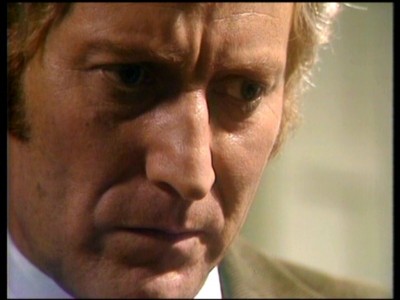
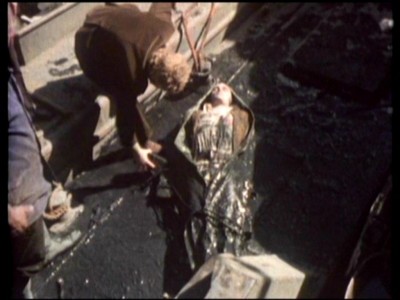
Van der Valk certainly won't hold any surprises for fans of vintage U.K. television detective series. Those familiar with the form know that the visual design of the episodes will be a mixture of videotaped interiors and 16mm-shot exteriors, while the interior sets will look...undernourished and stagy in comparison with comparable U.S. series of that time. And as well, dialogue will dominate over action; anyone new to these kinds of U.K. series looking for a detective show along the lines of Hawaii Five-O or Mannix or Cannon is going to be sorely disappointed. If and when the action comes in a Van der Valk episode, it's sparse (and not particularly well-executed). Characters and the actual mysteries - along with the period detail and the location work in Amsterdam - are the primary draws here, and for the most part, they work reasonably well together.
I can't say as to the faithfulness of the series' adaptation of Freeling's fictional detective (I've never read his books), but series writer/producer Michael Chapman and writer Geoffrey Gilbert have managed to fashion an acceptable TV detective that obviously sparked some interest when he first appeared on ITV back in 1972. This six-episode series was followed by another set of episodes in 1973, with a four year long hiatus before returning with quite a few more episodes in 1977, and then after another extended break, Foster and the character returned again in 1991 and 1992 for a handful of movie-length episodes. 1972 was probably Foster's most visible year with U.K. and international audiences, not only because of the success of Van der Valk on the small tube, but also because of the worldwide acclaim he achieved with his sensational turn as "The Necktie Murderer" Bob Rusk in Alfred Hitchcock's startling return-to-form: the cold, brutal suspenser, Frenzy. And giving credit where it's due, Foster is most of the show here in Van der Valk. Combining an almost impish pugnaciousness with his jangley, intense nervousness, Foster never looks completely relaxed or satisfied or at ease here, biting off his lines with a snappish impatience that goes a long way towards creating any dramatic tension and interest Van der Valk may have.
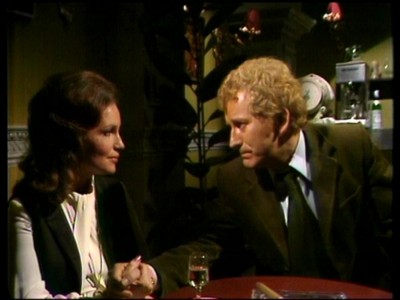
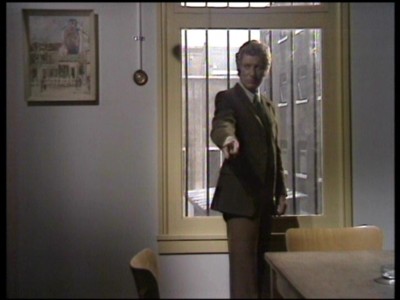
While it takes a moment or two to get used to Foster's and Latimer's English accents-on-Dutch policemen (as well as the instances of incongruous English slang, such as when Van der Valk asks someone "if they're taking the piss"), eventually you forget that small point and start to concentrate on the characters. In the opening episode, One Herring's Not Enough, we're given a picture of Van der Valk that's almost comical in its indolence. Shown to be constantly drinking on the job when he's not skipping out to enjoy the sun out in the park, Van der Valk seems to view his official duties as merely interruptions to his personal life, which includes, besides the ever-present bottle of beer or a glass of good wine, enjoying an endless supply of good cigars, or bantering about Baudelaire with his sharp, pretty wife in anticipation of a French-cooked meal. Indeed, in that first episode, Van der Valk seems to be constantly looking not for suspects but for five minutes away so he can down a quick drink, a habit that his bemused partner observes with good-humored acquiescence (it's quite funny when this happens before each "commercial break" in that first episode). In subsequent episodes, however, the writers have Van der Valk become much more morose, much more involved with his work - so involved, in fact, that his wife confesses to Kroon that she's worried that her husband is increasingly taking each case as a personal challenge to his abilities to solve them, a situation that compounds her worry about where she fits in with Van der Valk's life. Resigned and jaded (I love it when Foster, talking with his boss, says out of the blue: "When I drop dead, it will be a day just like this...a Thursday. Just about this time, too."), Van der Valk isn't above letting a murderer go if there isn't sufficient proof to convict them, leaving the viewer to wonder if Van der Valk's determination to find out the "truth" is really all he's interested in - with "justice" under the law a secondary, and at times, unnecessary consideration.
Unfortunately, the supporting characters are hardly delineated at all. Latimer's Kroon never goes beyond slightly annoyed, put-upon second banana (we never get even a glimpse of his private life...or thoughts), where he usually functions merely as a sounding board for one of Van der Valk's snotty put-downs (when Kroon lights up a cigarette, the bullish-on-cigars Van der Valk sneers, "There's something thin and infinitely squalid about cigarette smoke."). Arlette fares somewhat better, but not much, as Van der Valk's sultry French wife (Travers is dishy here). While she shows up briefly in every episode, she's brought in many times in very incongruous ways (meeting him for a drink out the blue, during his work day, for example, to allow Foster to link some exposition), and except for a time or two where she worries about her husband, her interior life is as blank as Kroon's. As for the mystery plots, they're serviceable but nothing startlingly original. We're given tantalizing little tidbits of the "seamier" side of Amsterdam, with hints of sex shops and transvestite bars (as well as a floating sex barge used for blackmail purposes), but the story lines for the most part follow conventional lines, with the sometimes open resolutions popular at that time. The location work helps open up the claustrophobia of the small sets, but they're really nothing more than pick-up shots, placing Foster and the cast on street corners and in cars to give the episodes of feeling of taking place in Amsterdam (according to what I've read, later series of the show feature more location work). For all its familiarity and drawbacks common to this genre out of the U.K., though, Van der Valk still works on the strength of Foster's performance, as well as from the nostalgic pleasures one can experience from such vintage exercises in TV programming.
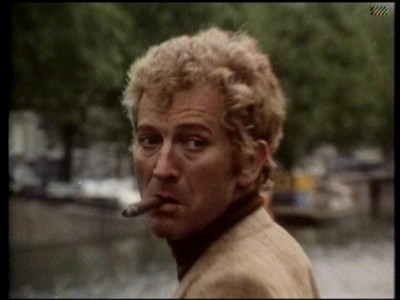
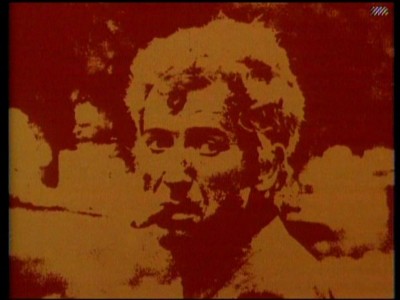
Here are the six episodes of the two-disc Van der Valk Mysteries: Set 1, as described on their slimcases:
DISC ONE
Episode 1: One Herring's Not Enough
A teacher confesses to murdering his wife and her young lover, but the police find no evidence of a crime. Commisaris Van de Valk is reluctant to dismiss him as a crank, though. The man may not be a killer yet, but he could still harbor deadly intent.
Episode 2: Destroying Angel
Van der Valk investigates the poisoning death of a man renting a room above a seedy Amsterdam bar. Believing the murder method points to a female culprit, he suspects a link with the brothel that also operates upstairs.
Episode 3: Blue Notes
When a world-famous Dutch violinist returns to Amsterdam for a rare performance, he receives a series of death threats. Someone even smashes his Stradivarius. Van der Valk can't fathom why anyone would want to hurt the virtuoso - but that doesn't mean the treat isn't real.
DISC TWO
Episode 4: Elected Silence
When the daughter of a controversial right-wing journalist disappears, Van der Valk has trouble keeping his personal feelings for the man private, despite warnings from his boss. The ransom demand leaves the detective perplexed and the father struggling with his past.
Episode 5: Thicker Than Water
A young English aristocrat turns up dead in an Amsterdam canal, but his mother shows little interest in finding the killer. Van der Valk and Kroon begin to piece together the man's history, which leads them on a tour of the city's transvestite clubs and bars.
Episode 6: The Adventurer
A deadly car crash has Van der Valk flummoxed - and fearful. Why was the victim carrying a gun and a photo of a local stonemason? No one shares his concern, however, including the mason, who dismisses the offer of police protection. But Van der Valk can't walk away just yet.
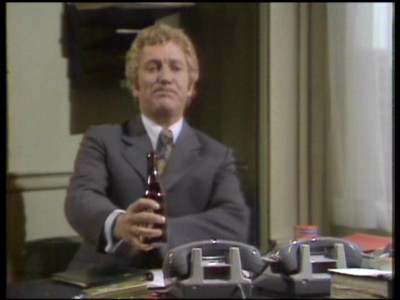
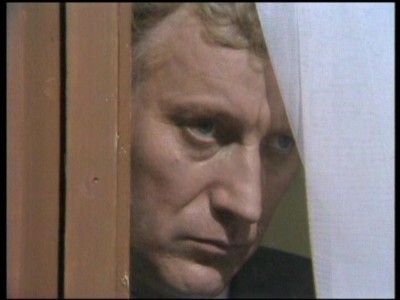
The DVDs
The Video
Acorn has their standard disclaimer on the back of the Van der Valk Mysteries: Set 1 slipcase, warning the consumer that due to the age and the recording technology of the original materials (and the superior resolution properties of DVD), flaws may be present that were beyond post-production correction. Which, in a nutshell, means crappy pictures and sound. The full-frame, 1.33:1 transfer looks about on par with most of these U.K. series shot at this time: the video is murky and noisy, and the 16mm footage soft and grainy. Still, all in all, it doesn't look any worse than when first viewed on some snowy black and white TV back in 1972, and the transfer itself shows no sign of compression issues or PAL conversion problems. Just don't expect DVD perfection, and you'll be fine with it.
The Audio
Same for the audio. However, there is something Acorn could do to help with the muddy sound: provide subtitles or close-captions. Acorn has been better about doing this, and yes, I realize it costs more money to produce, but with a vintage show like Van der Valk Mysteries: Set 1, it can only help the viewer smooth over the rough technical spots.
The Extras
The only slight extra here is the expected Acorn text bio: this one is about Van der Valk novelist, Nicolas Freeling.
Final Thoughts
No great shakes as either a detective show or as an example of classic vintage TV, Van der Valk Mysteries: Set 1 does have, however, a terrific lead performance by expansive, irritated Barry Foster, and that's more than enough to put Van der Valk over into the plus column. Location work in Amsterdam helps a little, too, and the mysteries, such as they are, move along well enough, but in the end, Foster is the whole show. I recommend Van der Valk Mysteries: Set 1.
Paul Mavis is an internationally published film and television historian, a member of the Online Film Critics Society, and the author of The Espionage Filmography.


|
| Popular Reviews |
| Sponsored Links |
|
|
| Sponsored Links |
|
|
| Release List | Reviews | Shop | Newsletter | Forum | DVD Giveaways | Blu-Ray | Advertise |
|
Copyright 2024 DVDTalk.com All Rights Reserved. Legal Info, Privacy Policy, Terms of Use,
Manage Preferences,
Your Privacy Choices | |||||||














